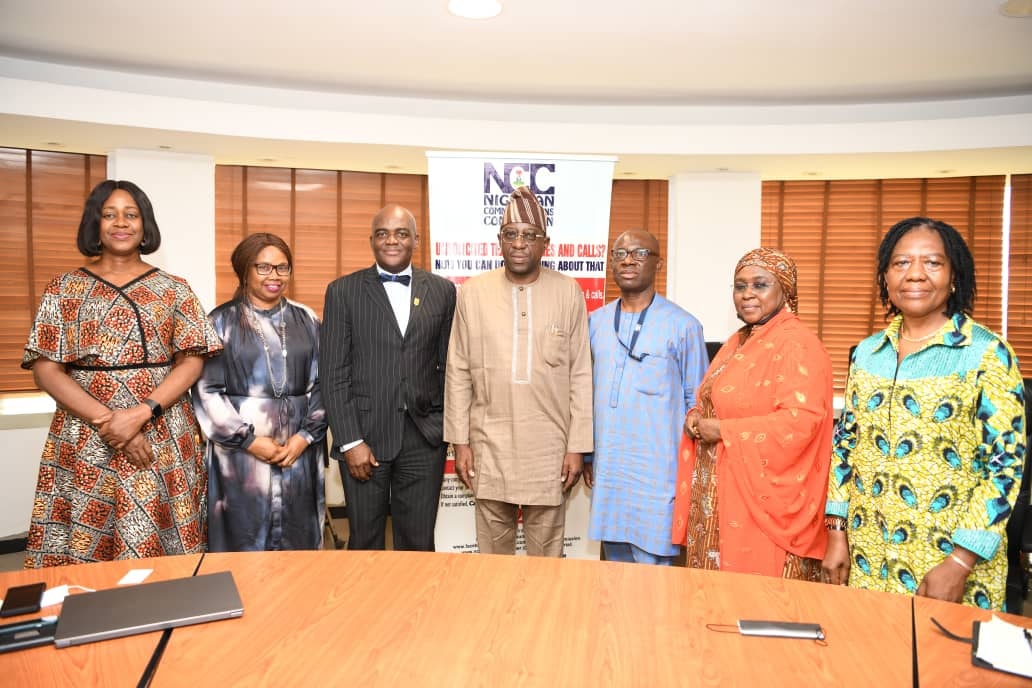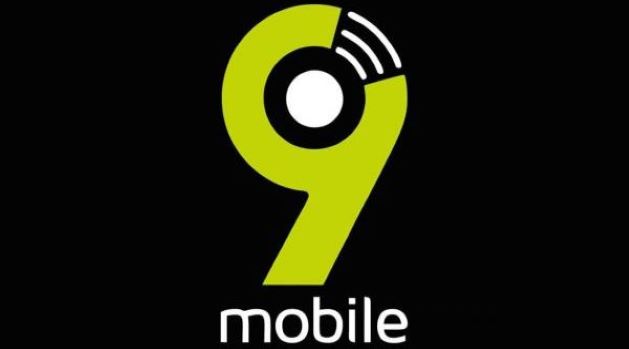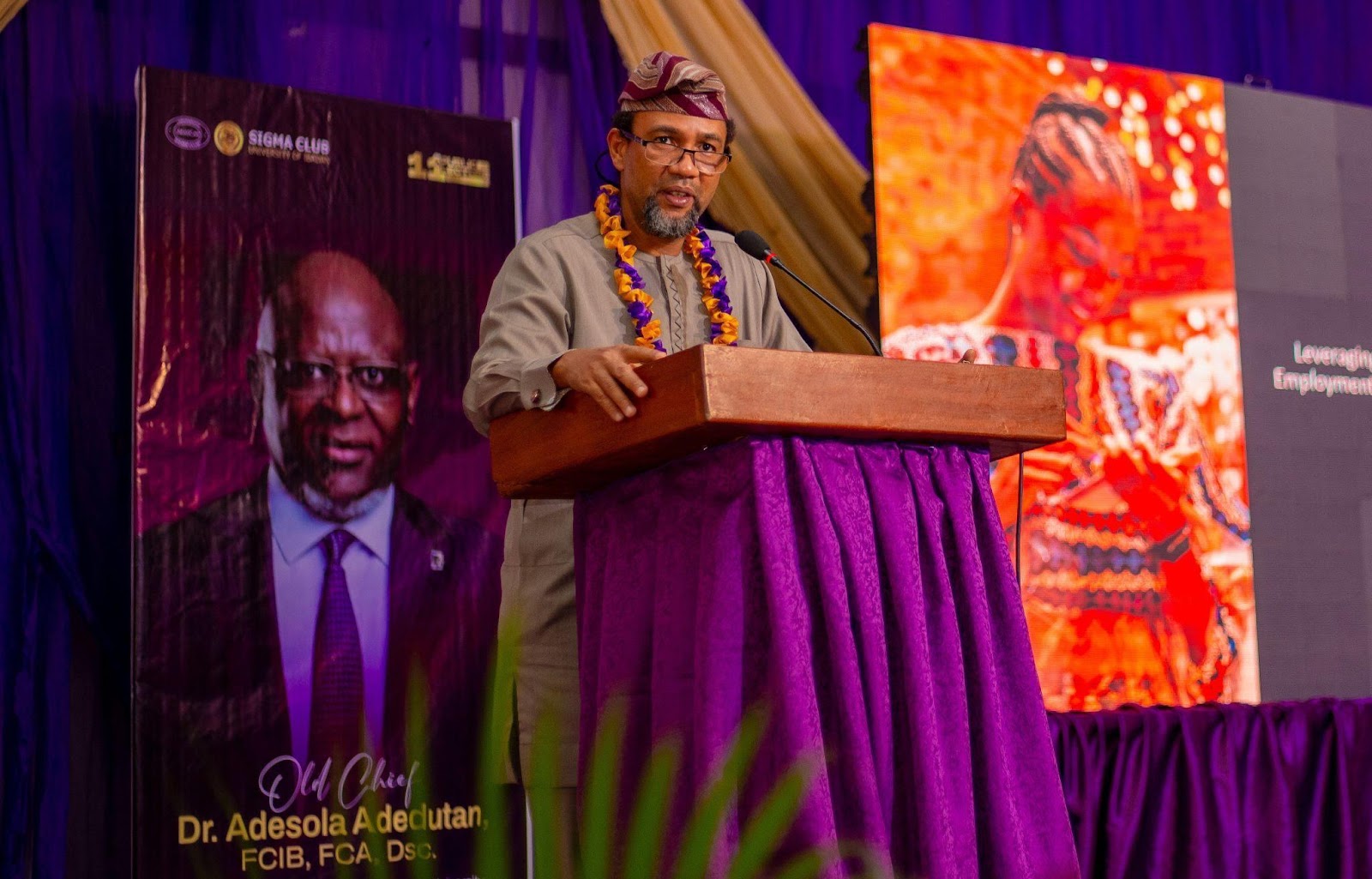Telecom
NCC Partners Lagos Business School on Capacity Building

The Nigerian Communications Commission (NCC) and the Lagos Business School of Pan-Atlantic University are considering forging a partnership that will result in developing customised capacity building interventions and overhauling of existing training courses offered by the LBS to address critical areas of needs of the Commission’s human capital development.

L -R; Mrs. Grace Ojougboh, Head, Media and Public Relations, Nigerian Communications Commission, (NCC); Mrs. Nkechi Iwegbu, Head, Custom Executive Education, Lagos Business School (LBS); Mr. Victor Banjo, Director, Executive Education, LBS; Mr. Adeleke Adewolu, Executive Commissioner Stakeholder Management, NCC; Mr. Kelechi Nwankwo, Head Research and Development, NCC; Mrs. Safiya Jijji, Head, Human Capital,NCC; Edith Afundu, Head,Policy Management, NCC
Prof. Umar Danbatta, Executive Vice Chairman (EVC) of the NCC, emphasized the imperative of such collaboration during a visit of an LBS delegation led by the School’s Director, Executive Education, Victor Banji, to the Commission’s Head Office in Abuja recently.
The EVC spoke through NCC’s Executive Commissioner, Stakeholder Management, Adeleke Adewolu, who received the LBS delegation (alongside other senior management staff of the Commission) on behalf of the EVC.
Addressing the visiting team, Adewolu said NCC constantly engages in staff training as part its strategy to build managerial and technical skills required to manage the ever-dynamic telecoms regulatory environment in Nigeria.
Adewolu said while LBS, has been a training partner of NCC over the years and currently provides some classes of capacity building to staff of the Commission, it has become necessary to expand the training scope by ensuring that other customized programmes that target specific needs of Commission’s human capital are designed by the School in collaboration with NCC team to meet strategic objectives and enhance the relationship of the two organisations.
Among the areas of interest to the Commission are courses on performance appraisal management, policy formulation and execution, risk management, technical report writing, telecoms-related training, tariff and competition management, as well as basic training on policy formulation and implementation, social media training, audio-visual editing, among others.
“I thank the LBS for its collaboration with NCC over the years in the area of human capital development. However, we expect that LBS will work with NCC to see how we can collectively overhaul the existing courses and bring new course to NCC’s attention which we would, in turn, subject to our training need analysis (TNA). This may result in a review of our existing Memorandum of Understanding (MoU) towards making our relationship much stronger and more mutually beneficial,” Adewolu said.
The Executive Commissioner also explained that though NCC is a regulatory agency, it has seen the need for indigenous digital skills development in Nigeria, and that explained the creation creation of the Digital Bridge Institute (DBI), by the Commission to meet the human capital needs of the burgeoning telecom, and broadly, the ICT sector.
According to Adewolu, other areas of focus in meeting educational needs of the sector, include indigenous digital skills development, sponsoring of hackathon, provision of research grants to the academia, endowment of professorial chairs in universities, and the acceleration of digital infrastructure deployment across the country to boost digital literacy and skills for Nigeria’s socio-economic development.
Speaking earlier on the purpose of the visit to the Commission, Banji of LBS, said the business school wishes to serve as a strategic capacity development partner to NCC for its teaming staff; revisit LBS’s existing MoU for necessary enhancements; as well as offer corporate governance, board leadership and management development programmes to enhance corporate effectiveness.
Banji also commended the NCC for its role in ensuring effective digital transformation in Nigeria. “As the Commission responsible for creating an enabling environment for telecom operators and allied stakeholders in the industry, as well as ensuring the provision of qualitative and efficient telecommunications services throughout the country, NCC has earned a reputation as a foremost Telecom regulatory agency in Africa,” Banji said.
In addition, the LBS Executive stated that while his organisation will continue to play a prominent and leading role in building leaders with integrity for Nigeria, Africa, and the world, it also believes that with effective directors and leaders in the public sector organisation such as the NCC, Nigeria will be managed more efficiently for greater value and sustainable growth.
“Our conviction at LBS is that telecommunications penetration is one of the critical developments required to transform poverty into prosperity.
“Our thesis is simple: the access to and use of mobile telephony contributes to the health of the population and efficiency of the economy.
“It is equally a lever for poverty reduction as contained in Goal One of the Sustainable Development Goals (SDGs), Banji declared to emphasize the centrality of telecoms as an enabler of development.
Telecom
Court to Decides on 9Mobile Ownership Tussle September 24

Federal High Court in Abuja has fixed September 24 to rule on several applications in the case of Abubakar Ismaila Isa, a businessman, who claims that his 43 million shares were allegedly transferred to Emerging Markets Telecommunication Services Limited, operating under the trade name 9mobile, without his consent.

The matter before Justice Mohammed Umar on Wednesday, was filed by Isa’s legal team led by Femi Atteh, SAN, in suit number FHC/ABJ/CS/1971/2024.
The plaintiff seeks an order declaring him the “beneficial owner of the 43,000,000 (forty-three million) ordinary shares held in trust for him by the 1st Defendant (Seltrix Limited) in the capital of the 3rd Defendant (Teleology Nigeria Limited).”
He accused Seltrix Limited of purportedly transferring the said shares to 9mobile without his consent, resulting in the alleged illegal change of control of 9mobile to LH Telecommunication Limited by the Corporate Affairs Commission and Nigerian Communications Commission.
Joined as defendants in the suit are Seltrix Limited, Hayatu Hassan Hadeija, Teleology Nigeria Limited, Mohammed Edewor, Emerging Markets Telecommunications Limited, CAC, NCC, LH Telecommunication Limited and General Theophilus Yakubu Danjuma (Rtd) (first to ninth defendants).
A counter-affidavit sworn to and filed on behalf of Seltrix Limited, Hadejia had described the plaintiff’s application as a reckless abuse of the court process.
He urged the court to dismiss the application and award substantial costs against the plaintiff.
He also demanded concrete evidence of any trusteeship arrangement involving him or Seltrix Limited concerning the alleged N43 million ordinary shares in the capital of the third defendant, Teleology Nigeria Limited, or any matter related to the suit.
Hadejia stated that the plaintiff’s motion, dated 27 January but filed on 28 January, was a fabrication designed to mislead the court.
At the resumed hearing, Michael Aôndoakaa, SAN, counsel for Teleology, 9mobile, and others, drew the court’s attention to his preliminary objections, asking the court to strike out the case for “being statute-barred” as it was filed out of the stipulated time required.
Telecom
MTN, 9mobile Commence Ground-breaking National Infrastructure Partnership

In a landmark move set to redefine Nigeria’s telecom landscape, MTN Nigeria Communications Plc and Emerging Markets Telecommunications Services Limited (9mobile) have officially announced the rollout of their national roaming agreement, approved by the Nigerian Communications Commission (NCC).

The three-year agreement enables 9mobile subscribers to roam seamlessly on MTN Nigeria’s expansive network, significantly extending 9mobile’s coverage and improving service quality for its customers. The partnership signals a shift toward greater industry collaboration, aligning with the NCC’s vision for a more inclusive and efficient digital ecosystem.
Beyond infrastructure sharing, the agreement drives greater operational efficiency, stronger connectivity, and an enhanced user experience. It also paves the way for deeper collaboration between the two telcos, most notably a proposed spectrum leasing deal, in which 9mobile will lease its 900MHz (5MHz) and 1800MHz (15MHz) bands to MTN for three years, further strengthening MTN’s network capacity and service quality.
“This partnership marks a bold resurgence for 9mobile,” said Obafemi Banigbe, CEO of 9Mobile. “It empowers us to meet the needs of our customers, especially youthful and enterprise users, by delivering consistent, high-quality service as we roll out city by city in the weeks ahead.”
Banigbe acknowledged the leadership of Dr. Aminu Maida, Executive Vice Chairman and the leadership of the NCC, for enabling such progressive industry collaboration, and Dr. Bosun Tijani, Honourable Minister of Communications, Innovation, and Digital Economy, for his advocacy of a resource-efficient, consumer-first telecom ecosystem.
“In today’s telecom environment, access is more strategic than ownership,” Banigbe added.
“Access to infrastructure is now more important than ownership,” Banigbe added. “Rather than duplicating networks, we’re investing in access that is commercially viable and sustainable. Network infrastructure typically accounts for 70–75% of an operator’s costs, savings here mean we can reinvest in innovation and customer experience. At 9mobile, our mantra is simple: build infrastructure where necessary, share it where possible,” he concluded”
Dr. Karl Toriola, CEO of MTN Nigeria, described the agreement as a milestone for the sector, “This collaboration underscores our commitment to industry innovation, customer-centricity, and support for the NCC’s goal of a fully connected Nigeria,” said Toriola. “It reflects our shared value philosophy, prioritizing partnerships that benefit the entire ecosystem.”
Toriola also praised Dr. Tijani’s efforts in promoting meaningful collaboration as a key driver of digital access, service quality, and nationwide inclusion.
This pioneering agreement sets a new benchmark for infrastructure sharing in Nigeria. It exemplifies how competitors can collaborate to address systemic challenges, reduce redundancies, and collectively transform the industry—ultimately delivering broader coverage, better service, and faster access to emerging technologies for Nigerian consumers.
Telecom
Karl Toriola Champions Digital Education for Employability @Sigma Club Lecture

MTN Nigeria CEO, Dr Karl Toriola delivered a strong call for digital skills adoption and curriculum reform at the 11th Public Lecture of the Sigma Club, University of Ibadan, on Thursday, July 3, 2025.

Speaking on the theme, Leveraging Technology & Digital Education for Mass Employment, Wealth Creation and Poverty Alleviation, Toriola said technology and education can drive large-scale transformation by unlocking access to both global and local job markets. He explained that digital tools enable entrepreneurship, remote work, and access to essential services, especially in underserved areas.
He pointed out several barriers: the infrastructure deficit caused by high deployment costs, poor electricity, and insecurity in rural areas; digital literacy and education gaps; gender and regional disparities; outdated or inconsistent government policies and weak public-private coordination.
Referencing a story about a high-achieving Nigerian doctor, he said, “I saw an article a few days ago about a Nigerian medical student or doctor that qualified simultaneously in [different] specializations of medicine. It’s incredible what some of our people are doing. Our youths are ready. Our systems must be ready too.”
Among his recommendations, Toriola called for expanded digital infrastructure, changes to school curricula, stronger public-private partnerships, and programs designed with gender and cultural awareness in mind. “We must make education employable,” he said. “We have to create the opportunities for students to practice what they are learning with institutions, private-sector institutions that are using those skills of the future.”
Toriola also emphasized that while automation and robotics dominate conversations about the digital economy, there is still significant opportunity in content creation, manufacturing, and agriculture. “Huge opportunities exist in Nigeria. We need to provide the environment for the Nigerian youth to thrive by driving connectivity, changing the curricula to allow our students to acquire the skills that are required in the job market of today.”
He closed with a message of encouragement, saying, “It does not matter however you start. Where you get to at the end of the day is a product of how dedicated, focused and hardworking you are. Never give up. Nigerians have an immeasurable capacity to deliver if given the right opportunities.”
Earlier, Hon. Folajimi Oyekunle, Deputy Chief of Staff to the Oyo State Governor, delivered the welcome address on behalf of Governor Seyi Makinde. He noted that the lecture’s theme was timely and aligned with the administration’s focus on innovation and inclusive development. Citing initiatives such as the Waste to Wealth program, which created 12,000 direct jobs, and the recruitment of 21,000 teachers, he highlighted efforts to improve employment outcomes in the state. He also mentioned that the state’s internally generated revenue had risen to 8.5 billion in the first quarter of 2025, compared to a pre-2019 average of 1.6 billion.
“The government so far has worked in line with all stakeholders to create an enabling environment for job creation, which gives our graduates the opportunity to be employed in government work. As a government, we continue to support and encourage wealth in the state and also to support programs like this, which in one way or the other, gives back to their school,” he said.
Other dignitaries present at the event included the Alaafin of Oyo, Oba Abimbola Owoade; Dr. Gani Adeniran, retired lecturer from the University of Ibadan’s Faculty of Veterinary Medicine, who served as Father of the Day; and Professor Gabriel Ogunmola, Chancellor of Lead City University, Ibadan.
Initiatives like MTN’s recently launched Digital Skills Academy reiterate the company’s commitment to expanding digital access and opportunity. The platform includes a career guidance tool to help users identify and pursue paths aligned with their strengths and market demand. It forms part of the MTN Foundation’s Digital Skills for Digital Jobs programme, which supports the National Digital Economy Policy and Sustainable Development Goal 4 on quality education.

 Telecom2 days ago
Telecom2 days agoNCC Approves MTN, 9Mobile Roaming Collaboration Deal

 Telecom1 day ago
Telecom1 day agoMTN Nigeria Debuts Game-Changing CPaaS Platform at NextNow Forum

 E-Financial1 day ago
E-Financial1 day agoNAICOM Issues New Licenses to SanlamAllianz Life, General Insurance

 E-Financial2 days ago
E-Financial2 days agoWorld Bank Approves Extra $65m for Nigeria’s SPESSE

 News1 day ago
News1 day agoAMCON Confirms ₦100Bn Sale of Ibadan DisCo Amid Legal Disputes

 E-Financial2 days ago
E-Financial2 days agoEcobank Taps Google Cloud to Deepen Financial Inclusion

 E-Financial1 day ago
E-Financial1 day agoGTCO to Become First Nigerian Bank to List on London Stock Exchange

 E-Business1 day ago
E-Business1 day agoDomain of Deception as Attackers Deploy Spyware Under Guise of Legal Threats



























